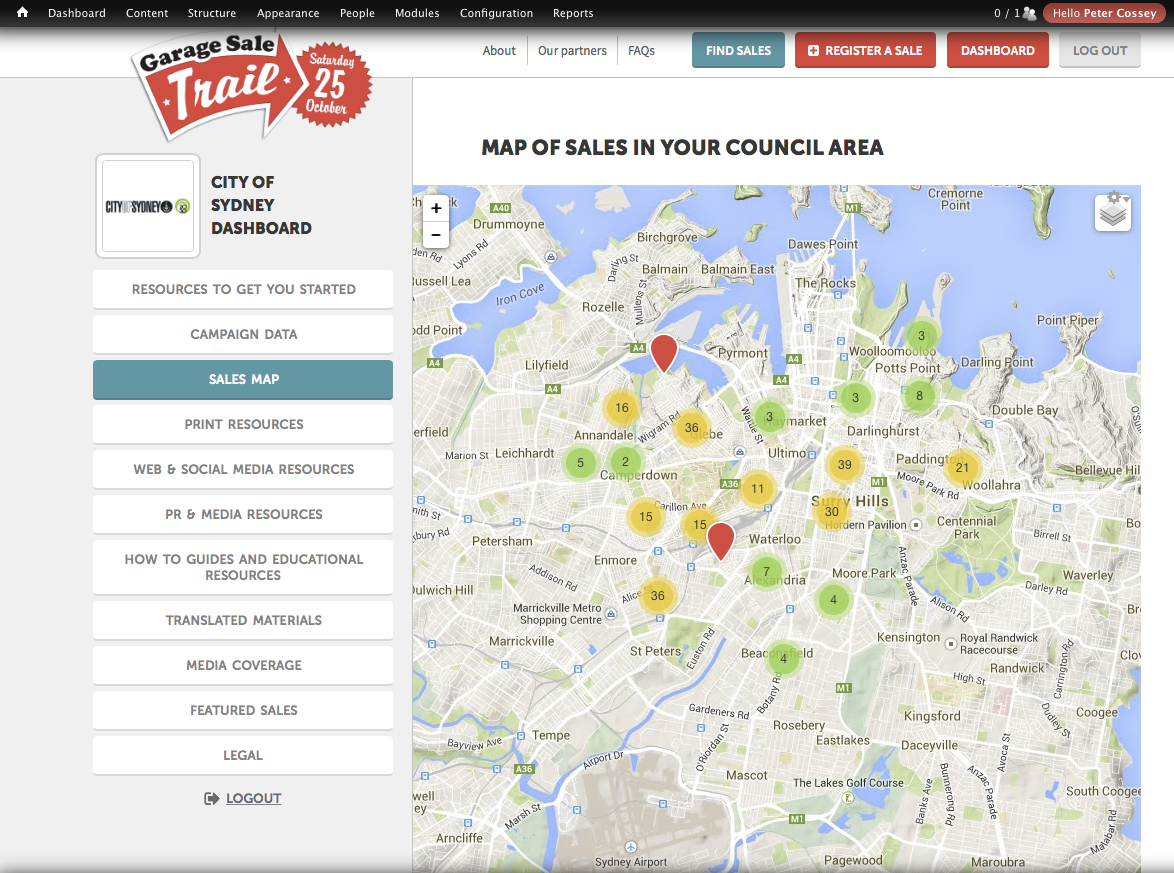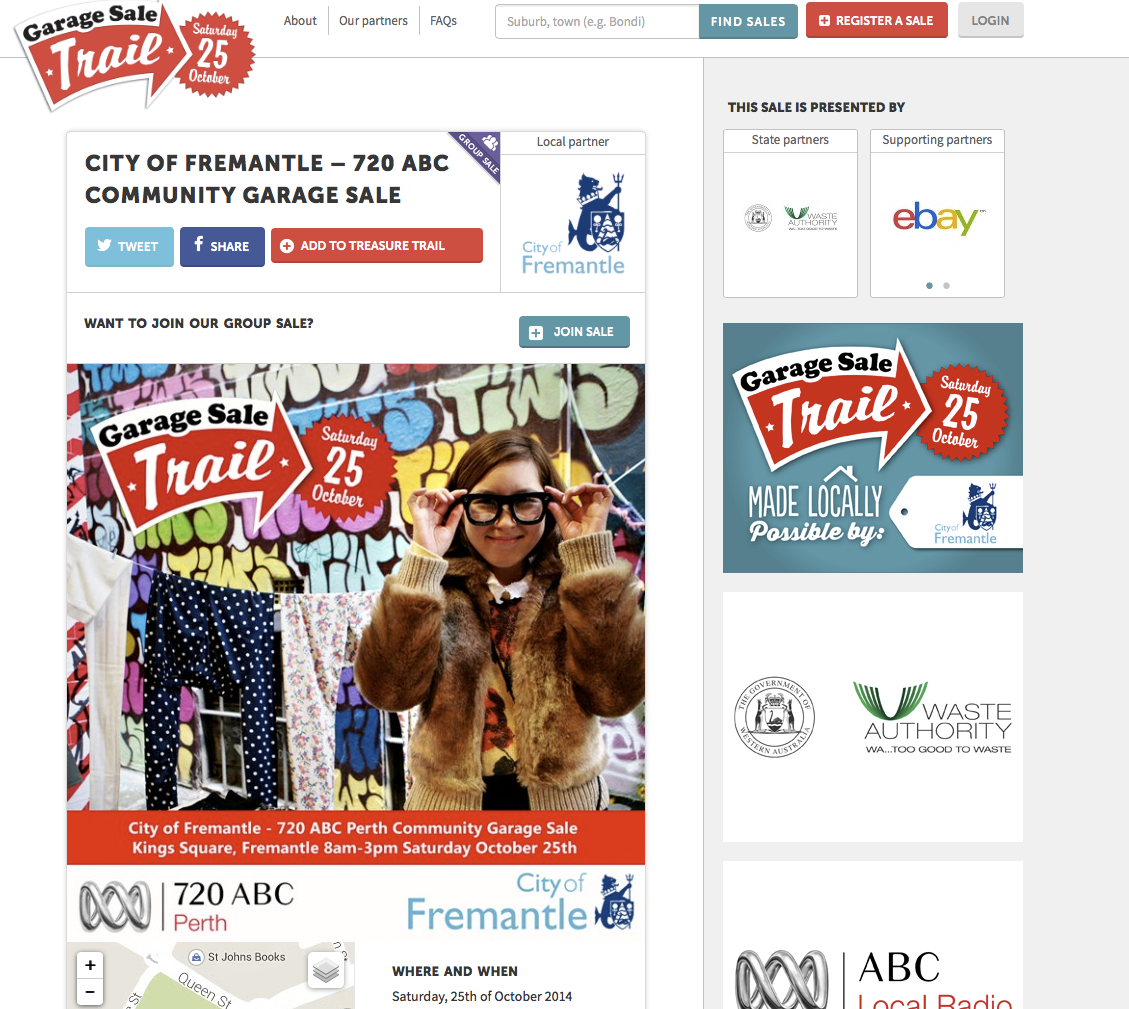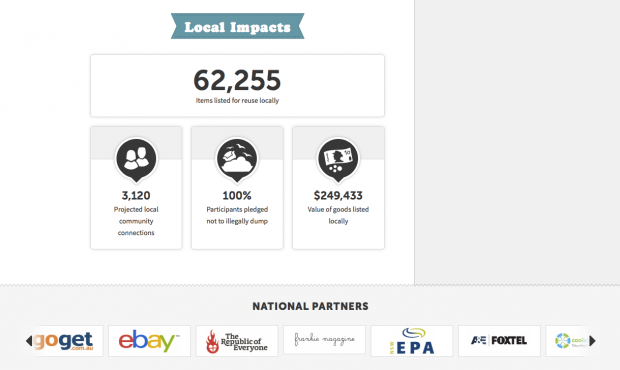 Support for Drupal 7 is ending on 5 January 2025—it’s time to migrate to Drupal 10! Learn about the many benefits of Drupal 10 and find migration tools in our resource center.
Support for Drupal 7 is ending on 5 January 2025—it’s time to migrate to Drupal 10! Learn about the many benefits of Drupal 10 and find migration tools in our resource center.Garage Sale Trail started from the seed of an idea: what if garage sales in the same area were held on the same day? What if we we could turn a single household event into a celebration of community?
Starting from a local event in Bondi, Sydney, Garage Sale Trail has grown over the last four years into Australia’s biggest community and sustainability event with thousands of garage sales across the country on the same day. With backing by local councils all over Australia, it’s a community event that reduces waste and clutter, encourages upcycling and reuse, and provides a day of fun and focus for community invigoration.
In 2014, Garage Sale Trail involved 100 councils throughout Australia (representing over 50% of Australia), over 8000 garage sales, and over 350,000 participants, and almost 3 million items listed for reuse, not to mention the thousands of burgeoning community connections.

With millions of expected views, peaking on the day of the event, the site needed to be rock-solid, which was achieved with a combination of aggressive caching strategies and a high-availability, multi-tiered web hosting infrastructure.
Additionally, Drupal provided the flexibility to cater to a number of key user-journeys on the site and provided a unified platform for the campaign.
The fact that Garage Sale Trail is an annual event was also a key driver in creating a platform that could be reused and iterated upon for upcoming years.

Garage Sale Trail team
The Garage Sale Trail team wanted a platform that was capable of accurately measuring key user metrics so that editors, publicists and other stakeholders were able to better address campaign goals. This data-driven approach to the platform allowed the Garage Sale Trail team to better respond to opportunities and obstacles at key points in the campaign.
In order to help the Garage Sale Trail team have the best possible campaign for their event, we created custom dashboards in Drupal that let the Garage Sale Trail team see up-to-the-minute trends and bumps in their campaign. Through this, they could segment their views, able to see what local areas were responding well and which might need more work.
It also helped the team partner cohesively with local governments, through tracking open rates and communications with local councils.
The site also provided hook ins to Garage Sale Trail’s social media presence, providing live updates throughout the campaign.

Council stakeholders
There were over 100 local community councils throughout Australia that participated as major stakeholders in the Garage Sale Trail campaign, sponsoring, supporting and spreading the message. To promote the Garage Sale Trail on the ground, they wanted to see the meaningful information about signups in their area.
Logging into the Garage Sale Trail site brought them to custom dashboards and metrics that tracked the number of signups in real-time, with easily segmented data in order to measure their progress. In the leadup, this meant they could see community involvement, and help them know the most strategic ways and means to grow awareness.
On the actual day of the event, metrics helped the councils to best harness community involvement in their area, and encourage participation. For example, by looking at the hotspots of garage sales on the map, they knew where to send staff with information or promotions for other council activities.
The Garage Sale Trail team was also able to track media mentions of Garage Sale Trails in specific areas and marketing materials , and then provide this information to councils through Drupal. This helped councils know that media was on board, gave councils content to use in their own communication, and increased feedback between council and community.
After the event, reporting allowed councils to pull relevant information about the effect of the Garage Sale, for post-mortem reports and communications, with data on everything from waste/environmental impact, community involvement and media outcomes.

Buyers and sellers
The website was also vital for individual sellers and buyers.
When visiting the Garage Sale Trail site, a seller could register their garage sale, put their location in, where it was pinned onto a map, and even list the items they had for sale.
Thus, when a potential buyer goes to the site, they can search for sales in their area, or even by items, with the option to wishlist items in advance, providing them with a checklist for the day for those who wanted to plan their ‘trail’ in advance.
After the event, sellers were able to ‘continue’ the garage sale by pushing unsold items they’d already listed to eBay, using the eBay.
Outcomes
The day, and the site, was a great success.
With over 3.5 million reached through social media, #garagesaletrail trended for over 6 hours on the day, and an online audience of over 2 million, including many mobile views. Throughout, the site remained rock-solid.
And because of the success of the event, in 2014, Garage Sale Trail won the Leadership in Citizenship and Communities from the Banksia Foundation.
“Garage Sale Trail has strong community engagement and great feedback from participants, backed by outstanding empirical data and results. This is a fabulous project and the enthusiasm is inviting and exciting.”
- 2014 Banksia Award Judging Panel
Technical specifications
Custom installation
Garage Sale Trail uses a custom installation profile to organise the project modules, themes and libraries. Using an installation profile was important for a few reasons:
The client wanted to invest in a platform that needed to be reused for each annual event.
The development team wanted a way to introduce new testing and continuous integration development workflows as the project grew over the long term.
Content Workflow
The content model of the website required a hierarchy of entities (nodes, taxonomy terms and flags) implemented using Entity Reference and References modules and their extensions. There were many user-facing multi-page forms which were linked to multiple entities and we used Multistep Nodeform module to manage those interfaces.
Content output
The frontend of the applications was managed with Page Manager and Page Manager Existing Pages module. The main driver for using Page Manager was the number of different layouts used across the site which were dependent on user or page contexts. For example, we had sale pages with different pieces of content displayed depending on a value of fields. These per-user page variations were easily implemented using Page Manager contexts and page variants.
Many pages displayed maps using Leaflet module and its extensions: both maps as field formatters and Views maps.
Site search was implemented with Search API and Search API Solr with the proximity search feature being handled by the Search API Location module.
Performance
We had to be prepared for a huge spike in traffic on the sales day (up to 58k pageviews per hour). To improve site performance a sophisticated caching strategy was implemented taking advantage of granular caching opportunities provided by Panels.
Where applicable some Panels panes used Panels caching (except panes containing user-dependent content, like flag links). For non-cached Views panes, Views caching was utilised. Aside from Views and Panels caching the site also used Entity cache to avoid loading fields and metadata from separate tables.
The hosting infrastructure used Varnish to cache pages for anonymous users. Because so many aspects of the site rely on realtime updates we implemented a strategy to do atomic cache clears using Cache actions and Rules modules for invalidating Drupal cache and Cache Expiration and Varnish HTTP Accelerator Integration for Varnish. We also used Memcached (through the Memcache API and Integration module) to speed up working with the cache.
Other organisations involved: Garage Sale Trail, Republic of Everyone.


